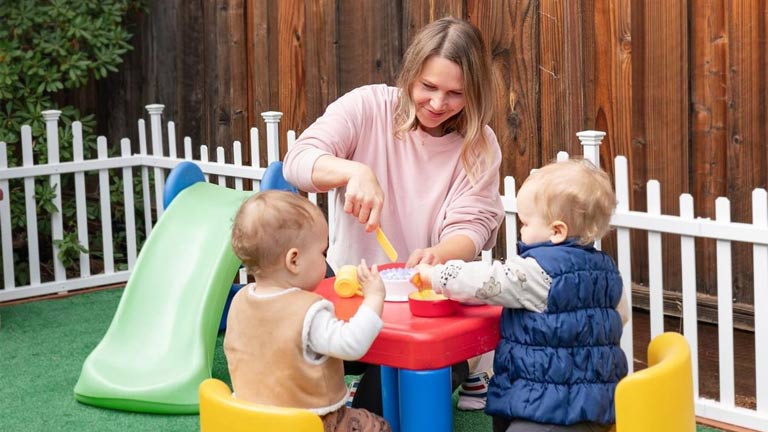
Parents must decide between hiring a nanny or enrolling their child in daycare. This decision is based on many factors, such as location, cost, and your family’s unique needs.
Daycare centers typically follow research-based curriculums and educational philosophies. These methods are used to help children thrive.
Cost
A family’s financial situation plays a role in deciding whether to use nanny care or daycare. Daycare centers and in-home daycares are less expensive than hiring a full-time nanny. However, the cost can quickly increase if your child attends several days per week.
Sometimes, splitting the nanny’s hourly rate with another family may be possible, which can help reduce the overall cost. This is an excellent option for families who want to hire a nanny but are worried about the price.
Nanny costs can be high, but finding someone who fits your child’s needs could be worth the investment. When you hire a nanny, you become their employer and must pay their salary, cover work-related expenses, and match their social security and unemployment contributions.
Daycares typically have a high child-to-caretaker ratio, making it hard for your child to receive individualized attention. This can be an issue if your child has special needs or is sensitive to crowds. On the other hand, studies have shown that children in one-on-one childcare settings develop language faster than their peers. They also learn coping skills quicker, which can be beneficial in their long journey to school.
Flexibility
Being a parent comes with a chain of decisions, from the smallest (which flavor pouch to give your little one today) to the bigger ones, such as how you’ll handle childcare once you return to work. And with US families spending more on childcare than rent, making the right choice is essential.
One of the main factors to consider when choosing between daycare vs nanny is how much flexibility you need. Many daycares have set hours and only accept children at certain times, which can be a major inconvenience if you work irregular hours or travel frequently.
With a nanny, the caregiving schedule is more flexible and usually takes into account your child’s naps, meals, etc. And because nannies typically work from home, they can also help with household chores, let in repair people, and take on other duties around the house that daycare workers might not be able to do.
While a nanny can be very flexible, she may need to be able to provide your baby with the socialization that a daycare setting can. A nanny may also have more than one infant in her care, which can mean less personal attention. And because nannies aren’t supervised like daycare staff, they may be held to a lower standard regarding discipline.
Safety
Parents often make a chain of decisions each day that affect the quality of life for their children. One such decision involves deciding where to get childcare, whether through a daycare center or a nanny. However, a family’s financial situation will determine which option makes the most sense.
If a family is tight on money, using a nanny may be the best choice. A nanny will provide personalized, one-on-one care for your child and can also help with basic housework. However, nannies will generally be less reliable than a daycare and can be more expensive.
Choosing a daycare will typically involve a greater risk of illness than using a nanny. Children are constantly around other kids in a daycare setting, which can lead to sharing toys and spreading germs. Additionally, many daycare centers follow standard pandemic precautions that make leaving a sick child behind difficult.
While a nanny will likely be responsible for choosing enrichment activities, a daycare typically has a set schedule of daily activities. This can make keeping your child on a regular schedule easier, whereas a nanny will probably have a more flexible routine. A nanny can also be more unpredictable in their availability, whereas a daycare is more likely to be open daily.
Schedule
The decision to use a nanny or daycare is one of the most significant decisions parents must make. Both choices are temporary and can be changed if they do not work for your family. The first step is determining what your schedule looks like. If your work requires you to commute, then finding a daycare that is close by will be necessary. This will also help ensure that your child will be picked up and dropped off at the correct times.
Another factor to consider is the size of your daycare. Larger daycares will have more children and may need more one-on-one attention. However, they will likely offer more educational activities. If your child has a special diet or health concerns, then it is essential that the daycare you choose can accommodate them.
It is also essential to consider what kind of personality you want in a caregiver. If you are looking for a nanny, you must interview multiple candidates and find one compatible with your child’s needs and parenting style. Also, if you are going with daycare, it is a good idea to tour the facility to get a feel for the environment and the staff. Once you have weighed the pros and cons, you can decide what is best for your family.




